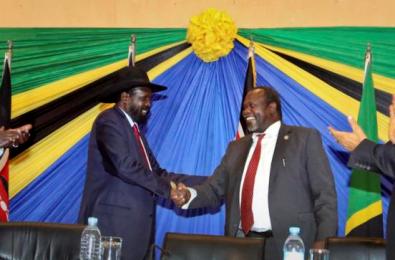Rebel leader says president has a lot to explain to S. Sudanese people
January 25, 2015 (NAIROBI) – South Sudan’s vice president, Riek Machar, who leads an armed opposition faction of the ruling party in the country, said president Salva Kiir, his main rival and partner in the peace process, will have a lot of explanations to do to the people for unnecessarily plunging the country into violent crisis.

“Salva Kiir will answer and explain to the people why he now accepted reforms and transformation when it was difficult for him and shot a bullet,” he said, adding that the “insanity of power” was the root cause of the country’s ongoing tensions.
Machar, who heads the rebel faction of the Sudan People’s Liberation Movement, said Kiir should resign over his actions, saying the issue of leadership was yet to be tackled by the warring parties.
Machar praised the provisions in the Arusha intraparty agreement, saying it addressed reforms and transformation of the ruling party which he lamented Kiir resisted violently for so long.
The opposition leader cautioned that the Arusha agreement was not for an individual but the party.
“It is a tailor-made agreement for SPLM,” he said.
He slammed allegations from the government which suggested the Arusha agreement was only meant to reinstate leaders from the rebel faction and former SPLM detainees and challenged their perceptions.
“The thinking is not reformed. They should be ashamed to say that,” he said.
The leadership in Juba should instead be concerned about how to reconcile with the South Sudanese people after instigating the violence against reforms and transformation they now accepted.
However, he said the implementation of the Arusha deal on reunification was not going to be easy as war was still raging on, saying most provisions of the agreement were subjected to ending the war.
NEW ARMY
The rebel leader also said a security arrangement would work on a mechanism to amalgamate the government and opposition forces during a transitional period, adding it was not going to be a reintegration into the other army.
He said the two forces will remain under separate controls while a gradual amalgamation of units from the two forces takes place into a new unified force.
Machar challenged that if the government claimed 70% of the regular army had defected to the rebels, and had to invite Ugandan troops to fill the vacuum, then it was not logical to reintegrate the 70% into the remaining 30%, but to amalgamate.
He accused Kiir of trying to create a tribal war in South Sudan when he recruited and trained militia groups of ‘Dutku Beny’ and ‘Mathiang Anyor” from his home states of Warrap and Northern Bahr el Ghazal, saying these ethnic militia forces massacred over 20,000 unarmed Nuer civilians in the capital.
He called on the AU’s commission of inquiry to make public its findings on the alleged genocide and other crimes committed in the aftermath of the 15 December 2013 crisis.
Other issues pertaining to governance and security arrangements as well as accountability and justice will be addressed in the peace process in Addis Ababa, he said.
(ST)
